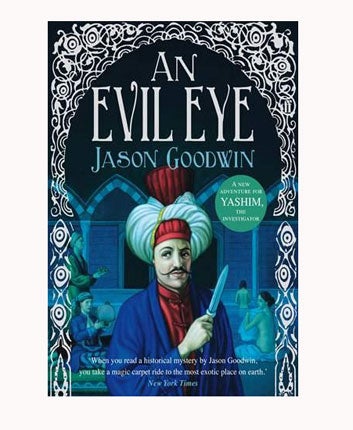An Evil Eye, By Jason Goodwin
Murder most foul on the Bosphorus

It's 1839, a dramatic moment in Turkish history.
The dreaded Sultan Mahmut II, who destroyed the Janissaries, is dead and his 16-year-old successor is moving into the palace: not the ancient royal warren of Topkapi but the modern, Frenchified Besiktas built by Mahmut. The old Sultan had not, however, abandoned one tradition: he had maintained a huge harem, which now has to be re-housed or dispersed with the coming of the new ruler, who would bring his own horde of women.
Naturally, there are many malcontents among the dispossessed, among them the old Sultan's sister, Princess Talfa. An expert at intrigue, she sets out to make life hard for the newcomers. Various minor unpleasantnesses (rat's tails in the make-up jar, wax figurines set with children's teeth) lead to greater horrors. Their culmination may lie in the dreaded "engine", a turntable which tipped recalcitrant women down into the Bosphorus.
Jason Goodwin's subtle investigator, Yashim, now on his fourth case, is especially suited to mysteries in the harem – for, as a eunuch, he is one of the few outsiders to have access to this secret world. But Yashim also has problems to solve outside. A body bearing a strange tattoo has been found in a monastery cistern and Yashim's old friend, the Polish ambassador Stanislaw Palewski, is able to identify the mark on the dead man as signifying membership of a secret Russian organisation. On the larger political scene, Turkey the "Sick Man of Europe" is already in decline and the Great Powers are waiting to pounce. So in Yashim's investigations the stakes are high indeed. Deeply embroiled in these complexities is Fevzi Ahmed, Yashim's old enemy, Moriarty to this Ottoman Holmes.
The bare outlines are enlivened by Goodwin's skilful use of colour and detail, especially Yashim's recipes, which set the reader drooling. As a historian, Goodwin is scrupulous. Giuseppe Donizetti Pasha, brother of the better-known Gaetano, was indeed Music Master at the Ottoman court. Goodwin's account of his efforts to instruct young ladies makes entertaining reading. Nor is this some idealised view of the harem, of pearly-skinned odalisques in marble baths. There is a horrific account of the death of a pregnant slave, and it is in a disused harem bath that another body is found. Historical novels may be sometimes lightly regarded, but this one is full of the virtues of that genre, bringing to life an immeasurably different world.
Join our commenting forum
Join thought-provoking conversations, follow other Independent readers and see their replies
Comments
Bookmark popover
Removed from bookmarks